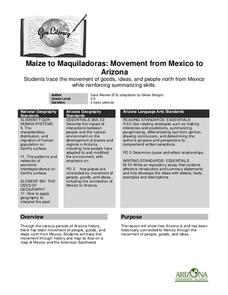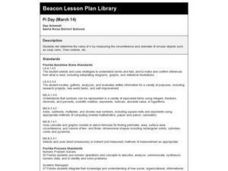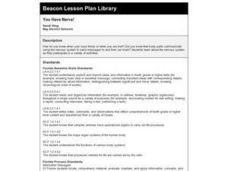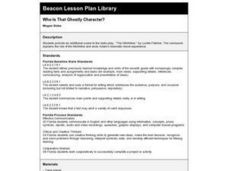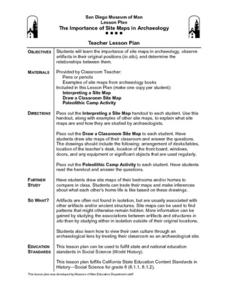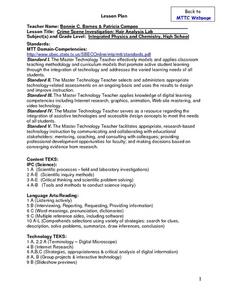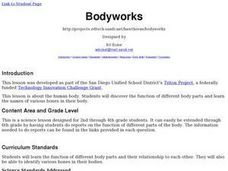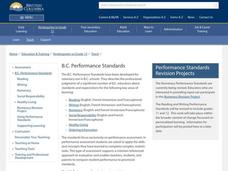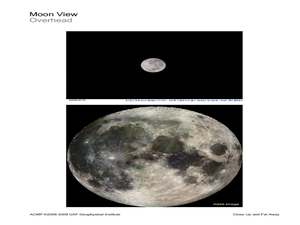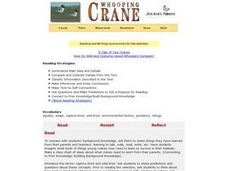Curated OER
Maize to Maquiladoras: Movement from Mexico to Arizona
Students label maps of Arizona and Mexico of the products that moved from one place to another. In this Arizona and Mexico lesson plan, students also summarize the effects of the movement on life in Arizona.
Curated OER
Using Newsprint as a UV Detector
Students investigate the effects of UV radiation. In this earth science lesson, students explain how the time of day relate to UV abundance on Earth. They determine if weather affects the amount of UV that Earth receives.
Curated OER
Pi Day (March 14)
Fourth graders determine the value of ? by measuring the circumference and diameter of circular objects such as soup cans, Oreo cookies, etc..
Curated OER
Beyond the Story: A Dickens of a Party
Seventh graders collaboratively research the life and times of Charles Dickens as it relates to a character from the story, and write and present a first-person character analysis.
Curated OER
You Have Nerve!
Fourth graders investigate the nervous system and how it communicates messages to and from the brain.
Curated OER
Who Is That Ghostly Character?
Eighth graders listen to a taped version of the radio play, "The Hitchhiker". They write a conclusion to the play and work with a partner to evaluate it before a final revision.
Curated OER
The Importance of Site Maps in Archaeology
Learners consider the importance of site maps in archeology. They interpret site maps, draw site maps of their classroom and home and then participate in simulated Paleolithic archeological camp activity.
Curated OER
Fossil Fuels vs. Alternative Fueling Systems
Fourth graders brainstorm the differences between the fossil fuels that people use in their transportation now and what they could use to minimize greenhouse gas emissions. They use a variety of techniques from webquests to writing...
Curated OER
Biographical Scene Investigators
Sixth graders become members of the BSI in this research simulation. They apply for Biographical Scene Investigator membership, investigate an individual, keep an evidence notebook and write an investigator's report.
Curated OER
Documenting Where We Are
Students contribute to discussions and identify how an artist elicits a viewer's response. They use William Henry Jackson's Pawnee Indian Village, photograph and painting. After analyzing this information, students use information gained...
Curated OER
Crime Scene Investigation: Hair Analysis Lab
Students participate in a hair analysis lab. Using a digital microscope, students compare and contrast hair samples. They determine if the hair samples are human or animal. After completing lab results sheets, students share their...
Curated OER
Bodyworks
Students study about the different parts of their body and the names of bones as well. They gain an understanding of the function about the parts. Students follow along as the teacher guides them and points out various parts and their...
Curated OER
Childhood Obesity
Students identify a question to generate appropriate data and predict results. They distinguish between a total population and a sample and use a variety of methods to collect and record data. Students create classifications and ranges...
Curated OER
The Cycle of Life
Eighth graders search for rites of passage in their own lives and study rites of other cultural groups in Louisiana and around the world. They assess how to recognize moments of importance in people's lives and find meaning in the stages...
Curated OER
Class of Cards
Students create patterns using images of everyday objects, shapes, or colors and four logos for use in a House of Cards. In this design lesson, students examine the work of Charles and Ray Eames and become familiar with the elements and...
Curated OER
Connecting the Dots? Geometry and Architecture
Students examine the connection between geometry and architecture. In this geometry and architecture lesson, students view a video which details a geometry class design project. Students then use the Internet in a scavenger hunt to find...
Curated OER
Permafrost
Students use a thermometer to analyze soil temperature data to determine which soil sample is normal, and which one is permafrost. In this permafrost lesson plan, students participate in a hands on activity where they identify the active...
Curated OER
Close Up and Far Away
Students use magnifiers and telescopes to view things close up. In this magnifiers and telescopes lesson plan, students use the tools to identify things that are close and far away. Students tell details of things they can see closer.
Curated OER
Sustainable Southern Belize: Coral Health Lesson Plan
Fifth graders investigate coral reefs and the dangers they face by labeling and drawing. In this oceanography lesson, 5th graders view a PowerPoint presentation of photographs of coral reefs in Belize. Students investigate...
Curated OER
Wind Power: From Eyesore to Energy
Students design their own wind turbine according to client's needs. In this science and technology lesson, students analyze the pros and cons of using wind power. They construct a model of their proposed wind turbine and present it to...
Curated OER
LBJ-- Escalation in Vietnam and Domestic Programs
Eighth graders investigate the Vietnam War. In this Vietnam War lesson, 8th graders research the escalation of the war during Lyndon Johnson's presidency. Students also explore the domestic programs that Johnson promoted. Students...
Curated OER
High Exposure
Students interpret data they receive from the media, discuss possible misinterpretation of data from the media and correctly respond to the misconception quiz question.
Curated OER
A Tale of Two Cranes How Do Wild and Costume-raised Whoopers Compare?
Students explore what young cranes need to do to survive.


